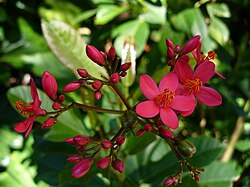Typical yield
1.7 t/ha
Varieties
3
Pest/Disease
6
Seasons
5
Profile
- Growth habit
- shrub
- Lifecycle (days)
- Perennial (juvenile 1–2 yrs)
- Primary uses
- Oilseed for biodiesel; hedges; soil conservation
- Pollination
- insect
- Origin / distribution
- Tropics/subtropics; drought-prone areas; cultivated in East Africa
Environment
Climate
Temp optimal
20–28 °C
Rain optimal
500–1200 mm/yr
Altitude
0–1500 m
Soil
pH optimal
6–7.5
Soil type
Well-drained sandy/loam; tolerates marginal soils
Farmer Guide
Row spacing
300 cm
Plant spacing
300 cm
Depth
3 cm
Seed rate
kg/ha
Nursery days
60
Planting: Use healthy seedlings or cuttings. Plant at onset of rains in pits (e.g., 45×45×45 cm) mixed with compost. Mulch and weed circles.
Transplanting: Do not damage taproot; set at collar height; firm soil.
Irrigation: Irrigate for establishment; thereafter minimal; water during extended droughts improves yield.
Fertigation: Low to moderate nutrient demand; split N in small doses early growth.
Pest scouting: Scout for leaf miners, mites, mealybugs/scale (sooty mold), and stem borers.
Pruning/Training: Top plants at 45–60 cm to encourage branching; maintain 3–4 primary branches.
Harvest: Harvest when fruits yellow-brown; multiple pickings per season as racemes mature.
Postharvest: Dry seeds to ~7% moisture before storage/pressing; avoid contamination.
Nutrient Schedule
| # | Stage | DAP | Product | Rate | Targets (kg/ha) | Notes |
|---|---|---|---|---|---|---|
| 1 | Basal (at planting) | 0 | Compost + NPK 17-17-17 | 2 t/ha + 80 kg/ha | N: —, P₂O₅: —, K₂O: — | Mix in pit; avoid root burn |
| 2 | Topdress (establishment) | 90 | CAN 26% N | 40 kg/ha | N: —, P₂O₅: —, K₂O: — | Light ring application; water in |
| 3 | Maintenance (pre-rains) | 365 | NPK 15-9-20 (or urea+MOP) | 80 kg/ha | N: —, P₂O₅: —, K₂O: — | Annual, adjust to yield |
Nutrient Requirements
| Nutrient | Stage | Amount | Unit |
|---|---|---|---|
| N | Basal | 20 | kg/ha |
| P₂O₅ | Basal | 20 | kg/ha |
| K₂O | Basal | 20 | kg/ha |
| N | Early_growth | 20 | kg/ha |
| K₂O | Early_growth | 10 | kg/ha |
| N | Maintenance | 20 | kg/ha |
| K₂O | Maintenance | 20 | kg/ha |
Images

| Name | Country | Maturity | Traits |
|---|---|---|---|
| Local Jatropha | KE | 450 | Drought hardy |
| Local landrace (seeded) | KE | 720 | Hardy; variable yield |
| Selected line (cuttings) | TZ | 540 | Earlier bearing; uniform canopy |
| Stage | Product | Rate (kg/ha) | Notes |
|---|---|---|---|
| Basal | Compost/manure (well-decomposed) | 2000 | Mix in planting pits |
| Basal | NPK 17-17-17 | 80 | Light dose at planting |
| Topdress | CAN 26% N | 40 | ~3 months after planting |
| Maintenance | NPK high-K (e.g., 15-9-20) or Urea+MOP | 80 | Annual before rains |
| Name | Type | Symptoms | Management |
|---|---|---|---|
| Leaf miner | pest | Serpentine mines; leaf blotching | Remove infested leaves; rotate actives if spraying |
| Mites (Tetranychus spp.) | pest | Stippling; webbing in dry spells | Maintain plant vigor; selective acaricides if needed |
| Mealybugs/Scale (sooty mold) | pest | Honeydew; black mold on leaves/twigs | Control ants; prune; horticultural oils/soaps |
| Stem borers | pest | Boreholes; branch dieback | Prune and destroy infested shoots; wound protection |
| Powdery mildew | disease | White powder on leaves; defoliation | Improve airflow; sulfur or suitable fungicides |
| Mosaic/viral diseases | disease | Mottling; leaf distortion | Rogue infected plants; vector control; clean material |
| System | Typical | Min | Max | Notes |
|---|---|---|---|---|
| rainfed hedge | 1 | 0.5 | 2 | Seed yield |
| rainfed low-input | 1 | 0.5 | 2 | Seed yield; increases after year 3 |
| managed orchard | 3 | 2 | 5 | Good selections, pruning & fertilization |
| Country | Region | Planting | Harvest |
|---|---|---|---|
| KE | Semi-arid | Mar–Apr / Oct–Nov | Jun–Jan (staggered) |
| KE | ASAL & sub-humid (long rains) | Mar–Apr | Multiple pickings after year 2–3 |
| KE | ASAL & sub-humid (short rains) | Oct–Nov | Multiple pickings after year 2–3 |
| UG | Northern & eastern dry zones | Mar–Apr | Staggered once mature |
| TZ | Central & northern semi-arid | Nov–Dec | Staggered once mature |
| Country | Region | Suitability |
|---|---|---|
| KE | ASAL counties; lower mid-altitudes | High |
| KE | Cool highlands >1800 m (frost risk) | Low |
| KE | Poorly drained wetlands | Low |
| KE | Semi-arid | Medium |
| TZ | Central plateau; northern semi-arid | High |
| UG | Northern & eastern semi-arid | High |
